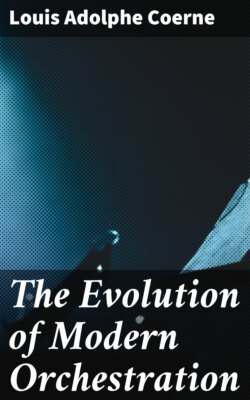Читать книгу The Evolution of Modern Orchestration - Louis Adolphe Coerne - Страница 23
На сайте Литреса книга снята с продажи.
III.
ОглавлениеTable of Contents
But while the nature of Italian music after Cavalli's time was subject to variable influences, France took up the cause of drama with enthusiasm, and in this field Lulli (1633-1687) looms up as the sole dictator of his age. Favored by the extravagant demands for display and spectacular effects prevalent at the court of Louis XIV, Lulli proceeded to develop dance forms as had been inaugurated by his predecessor, Cambert, whose position he usurped. The ballet de cour, already in vogue in France, consisted of dances, dialogues set to music, combined with dramatic episodes. Out of this native form of entertainment, modern French opera was destined to germinate. Having found this a suitable prototype as a basis for his operas, Lulli proceeded to imbue it with exotic principles. Like Monteverde, he discarded the ecclesiastical modes. Again, he adhered strictly to the requirements of his text, and developed declamatory recitative as promulgated by Cavalli. And to the reactive influence of the Italian monodic theorem upon French literature during this brilliant period of Corneille, Molière, Racine, does France owe the excellence of her declamation.
But, considering the versatility of the man, once again a disappointing analogy to the peculiarly prominent deficiency of Carissimi and Cavalli confronts us. For Lulli's orchestration was, like that of Meyerbeer two hundred years later, sensational rather than of enduring worth. By no means is Lulli's universal genius as organizer, composer and orchestrator to be undervalued, nor is the importance of his influence upon subsequent French music to be lost sight of. But it is evident that the direct evolution of really stable instrumentation was benefited, during this period, more by the crowning achievements of Scarlatti, and by the labors of the secondary Italian composers, who devoted themselves more especially to purely instrumental music, and thereby sowed the seed for subsequent purely orchestral music in Germany. It is true that credit is due to Lulli for having introduced into his orchestra a large variety of instruments, which he used with considerable skill, although all of them were not suitable for permanent retention; but it would appear to the present writer that Lavoix, in his "Histoire de L'Instrumentation," page 216, is, perhaps, somewhat extravagant in his eulogy of Lulli's orchestration, especially since he previously makes but passing reference to that of Scarlatti. Again, similar use of solo effects and of contrasted groups of instruments as cited by Lavoix is also to be found in the scores of Lulli's predecessors and contemporaries in Italy. Indeed one might say that in general the efforts of these early composers to obtain genuinely characteristic tone-color are apt to be overestimated, for, as Lavoix himself subsequently acknowledges in regard to Lulli:—"Il faut l'avouer, c'était encore au violon qu'il avait confié ses scènes symphoniques les plus délicates et les plus expressives." Finally, even though strings formed the basis of his orchestra, augmented by wind instruments both wood and brass, the irrepressible harpsichord, solicitous for the welfare of her flock, and fearful lest emancipation from her protectorate should result in chaos, still closely followed the harmonic delineations of the legitimate orchestral instruments, supporting them, as it were, in concentual leading-strings! Had Lulli and his contemporaries understood the art of judiciously distributing the notes of a chord throughout the orchestra, not to mention the proper choice in number and species of instrument, this custom would have soon fallen into disuse; and, as we know, not until this did take place one hundred years later, was it possible to obtain ideal solidity, balance of tone, contrast, and variety. By a coincidence, the year of Beethoven's birth sounded the death-knell of the orchestral harpsichord, for in the opera "Mitridate," written in that year, Mozart was the last of the great composers to employ it as a regular component of the orchestra.
To Lulli, therefore, orchestration was but a secondary issue, in spite of the importance he attached to it. Form, on the other hand, was permanently benefited by his labors, whereas, in musical history, he occupies the second of the four pedestals sustaining the arch that spans the realm of pure music drama, and retires into the mythical haze of Hellenic tragedy.
